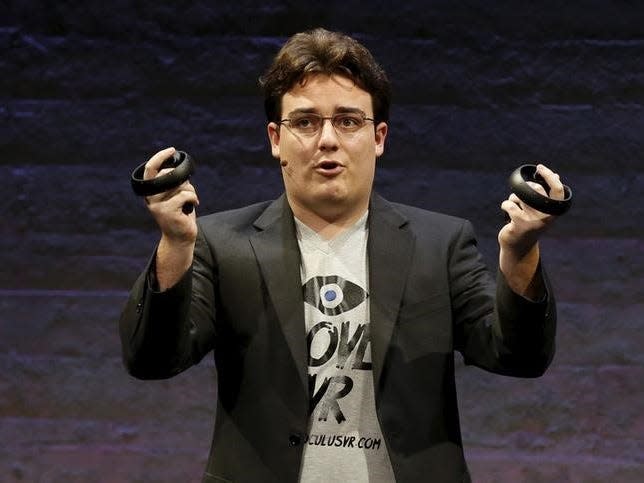
-
Luckey founded Oculus and sold it to Facebook for $2 billion in 2014.
-
He wants the metaverse to be built, but says Facebook’s current product Horizon is “not good.”
-
Still, Luckey sees the possibility of the company succeeding in the future.
Palmer Luckey is not a fan of what Mark Zuckerberg has so far produced for the metaverse, although he does think it could eventually succeed.
The Oculus founder, speaking Monday during The Wall Street Journal conference Tech Live, said of Horizon Worlds, Facebook’s core metaverse product: “I don’t think it’s a good product.”
Luckey sold Oculus, a virtual-reality startup, to Facebook in 2014 for $2 billion. That’s part of an investment of more than $15 billion in what Zuckerberg now calls the metaverse, an immersive digital world accessed through AR and VR devices.
The tech giant has little to show for this massive spending spree, apart from a new company name, Meta, a few VR headsets, and the early digital platform Horizon Worlds.
“It’s not good, it’s not fun,” Luckey said of Horizon. “Most people on the team would agree it’s not a good product.”
Luckey was fired from Facebook in 2016, which he said happened because of his political donations to an “unpopular” cause. He now runs Anduril Industries, a startup focused on security and defense products. Despite his divisive departure, Luckey is a longtime builder and fan of AR and VR, and he wants Facebook to succeed in building it.
“Mark Zuckerberg is the number one virtual reality fan in the world,” Luckey said. “He’s put in more money and time to it than anyone ever in history.”
He said the amount of money Zuckerberg is putting behind the project alone means there’s a chance Horizon Worlds will get better and the metaverse will be a success. “It is terrible today, but it could be amazing in the future,” he said. “Zuckerberg will put the money in to do it. They’re in the best position of anyone to win in the long run.”
It will take time and involve mistakes, he added, comparing it to a “project car,” a fancy automobile that the owner spends a lot of money on as a hobby.
“You hack at it and maybe no one else sees the value,” Luckey said. “Will they stumble? Yeah sure. Will they waste money? Will they add things to their project car that they later hack off? Yes.”
So far, Facebook’s shift to building the metaverse has been costly. The company last year lost $10 billion on Reality Labs, the division that now covers all metaverse projects including Oculus, renamed Meta Quest. It’s expected by Wall Street analysts to lose more than $10 billion again this year.
Wall Street has not responded well to the project so far, particularly as Facebook is now dealing with a slowing rate of user and revenue growth. After Zuckerberg earlier this month demoed avatars with legs that are not actually available, along with other metaverse advancements not ready for prime time, Facebook shares fell to their lowest price since 2018.
Are you a Facebook/Meta employee or someone with insight to share? Contact Kali Hays at khays@insider.com, on secure messaging app Signal at 949-280-0267, or through Twitter DM at @hayskali. Reach out using a non-work device.
Read the original article on Business Insider
Read More: news.google.com









 Bitcoin
Bitcoin  Ethereum
Ethereum  Tether
Tether  XRP
XRP  Solana
Solana  USDC
USDC  Dogecoin
Dogecoin  Cardano
Cardano  TRON
TRON  Lido Staked Ether
Lido Staked Ether  Wrapped Bitcoin
Wrapped Bitcoin  Avalanche
Avalanche  Chainlink
Chainlink  Sui
Sui  LEO Token
LEO Token  Stellar
Stellar  Shiba Inu
Shiba Inu  Toncoin
Toncoin  Hedera
Hedera  Wrapped stETH
Wrapped stETH  USDS
USDS  Bitcoin Cash
Bitcoin Cash  Litecoin
Litecoin  Hyperliquid
Hyperliquid  Polkadot
Polkadot  Bitget Token
Bitget Token  Binance Bridged USDT (BNB Smart Chain)
Binance Bridged USDT (BNB Smart Chain)  WETH
WETH  Ethena USDe
Ethena USDe  Pi Network
Pi Network  Monero
Monero  WhiteBIT Coin
WhiteBIT Coin  Wrapped eETH
Wrapped eETH  Pepe
Pepe  Coinbase Wrapped BTC
Coinbase Wrapped BTC  Uniswap
Uniswap  Dai
Dai  Aptos
Aptos  OKB
OKB  NEAR Protocol
NEAR Protocol  Gate
Gate  Bittensor
Bittensor  Ondo
Ondo  Internet Computer
Internet Computer  Tokenize Xchange
Tokenize Xchange  Ethereum Classic
Ethereum Classic  sUSDS
sUSDS  Cronos
Cronos